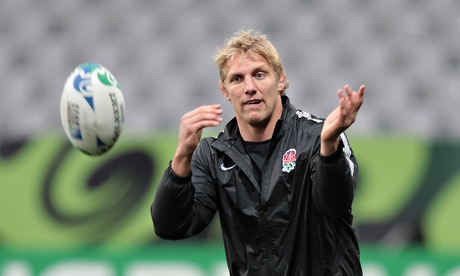
Lewis Moody and Rory Lamont have both called for rugby union to introduce stricter controls around concussion. The former players made their remarks at a parliamentary roundtable discussion about concussion in sport, called by the Labour MP Chris Bryant and Baroness Tanni Grey-Thompson. Bryant, a former amateur player, said he was "concerned that not enough is being done to ensure players and coaches are aware of the dangers from concussion".
Bryant warned that "if sporting authorities don't act now, lawsuits in this country are a real possibility". In the US, a judge recently rejected a proposed settlement of $765m between the NFL and a group of former players on the grounds that it was too low. Such a sum, Bryant added, would bankrupt professional rugby in Britain.
Lamont, who played 29 Tests for Scotland, explained that he had been "knocked out a dozen times" in his career, and had suffered concussion on countless other occasions, but had never admitted the extent of the problem to medical staff because he "wasn't aware of the long-term issues". Recent research has established a likely link between repeated concussions incurred while playing rugby and the disease CTE, formerly known as punch-drunk syndrome. Evidence is also emerging that there may be a link between CTE and football, a sport that has not yet introduced specific concussion treatment protocols.
"Every time I was knocked out I was able to pass the concussion tests and return to play within a week," Lamont said. "Even after passing all the tests I would still be getting concussion symptoms." He added that players could not be trusted "to be open and honest about the fact that they are still concussed because their careers are on the line and they stand to lose so much by missing matches."
Moody, a former England captain, echoed that sentiment. "It is in your fibre to want to stay on the pitch and be with your team-mates," he said. "So ultimately we have to take this process away from the players and put it in the hands of the doctors." The Rugby Football Union is introducing a mandatory concussion education programme for professional players and coaches at the start of next season. Peter Robinson, whose son Ben died of concussion-related illness in 2011, is among the campaigners calling for still more to be done.
More progress has been made in Scotland. James Robson, the doctor for the national team, said that he feels a cultural change is taking place, and pointed out that of the last five cases of concussion he treated on the field, two had been identified by team-mates of the injured player. The SRU has just launched a study into the long-term effects of concussion, to explore the potential links to CTE.
Bryant concluded that the two main aims must be to achieve greater consistency regarding concussion identification and treatment across all sports, and to improve co-operation between relevant agencies in health, education, and sport. He and Grey-Thompson are preparing a report that will be presented this year.

